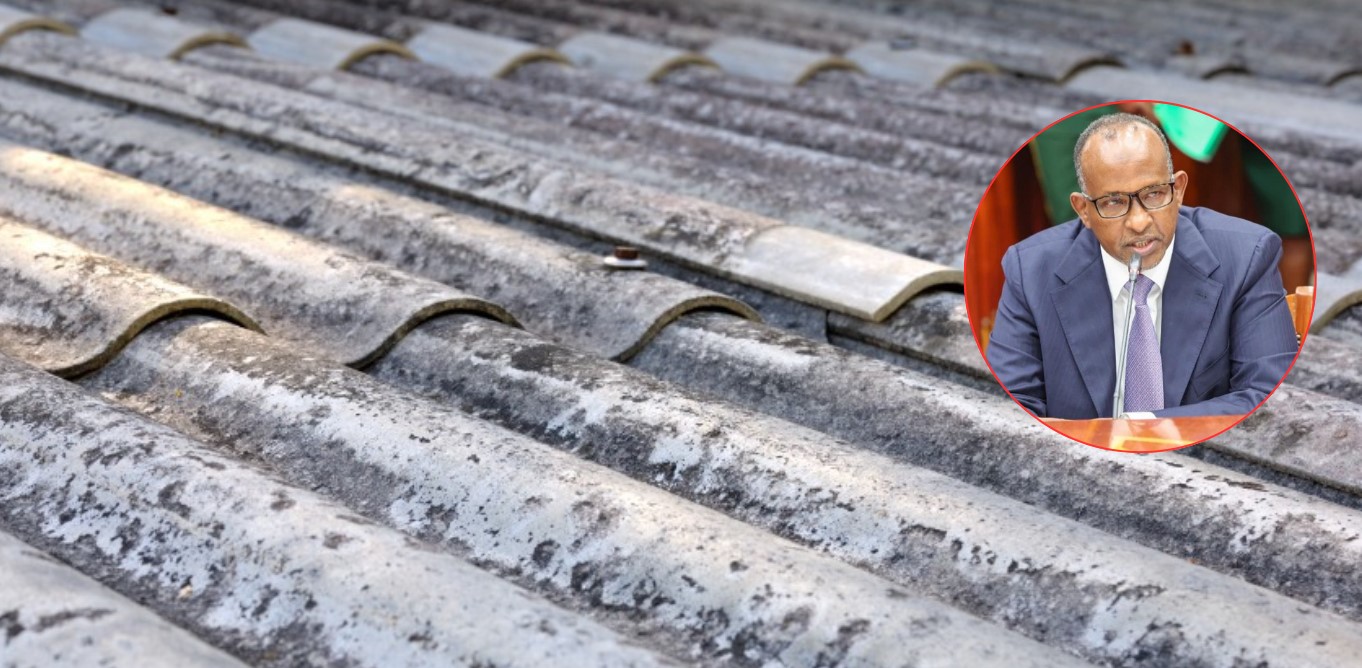Duale pledges to eradicate asbestos roofing in govt buildings by December

In his response, Duale acknowledged the dangers of asbestos, noting its association with lung cancer.
If the Committee on Appointments confirms Aden Duale as the nominee for Environment Cabinet Secretary, government entities still using asbestos for roofing must remove it by December 2024.
This follows a query from Nakuru East MP David Gikaria, who asked Duale what actions he would take concerning the continued use of asbestos.
More To Read
- Supporting Africa’s drylands: Insights from the pastoralists who call them home
- Mazingira Day: Why Sakaja's clean city dream is still a mirage
- NEMA issues 14-day ultimatum to businesses over pending licence applications
- Governor Sakaja vows to deregister private firms over illegal dumping of waste
- More than 140 environmental defenders killed in 2024
- NEMA under fire from Environment Institute of Kenya over unstable ENViS rollout, licensing chaos
“Most of our schools and institutions from colonial times have been using asbestos for roofing purposes. Asbestos, over time, has been a cause of cancer and environmental pollution. What plans are there for the nominee to address the use of asbestos in schools, health institutions, and other places?” Gikaria posed.
Developers commonly use asbestos, a versatile substance, for purposes such as soundproofing, ceiling tiles, and insulation. Its lightweight and easy-to-install properties contributed to its previous popularity as a roofing material. Additionally, asbestos is resistant to chemical corrosion, another benefit of its use.
In his response, Duale acknowledged the dangers of asbestos, noting its association with lung cancer. He revealed that the Environment Ministry and the National Environment Management Authority (NEMA) have identified several ministries still using asbestos.
“It is a serious matter since asbestos produces fibre that leads to lung cancer. The Ministry and NEMA have mapped out four ministries that still use asbestos since independence. These include the Ministry of Defence, specifically the barracks in Lannet, various schools, and the Ministry of Lands and Housing,” Duale said.
“If approved, I will give government entities until December 2024 to remove asbestos roofing. NEMA has already developed a disposal programme, and we will expect county governments to provide land for disposal purposes.”
Duale also announced plans to identify additional entities, including schools and churches, using asbestos within the next three months.
 Environment and Forestry CS nominee Aden Duale during his vetting by the National Assembly's Committee on Appointment on Friday, August 2, 2024. (Photo: Handout)
Environment and Forestry CS nominee Aden Duale during his vetting by the National Assembly's Committee on Appointment on Friday, August 2, 2024. (Photo: Handout)
“When we come to churches and other individual institutions, within the next three months, if this Committee approves me, we will do an audit and map the whole country where asbestos is still in place. It is a dangerous thing and a threat to our health, and it is a cause of lung cancer,” he said.
In October 2023, residents of Wajir North Constituency petitioned Parliament to compel the government to identify public buildings that were roofed with asbestos with the view of removing them.
Wajir North Constituency MP Ibrahim Abdi presented the petition to the National Assembly on behalf of the residents, urging the government to replace the asbestos with galvanised iron sheets.
The residents said the move would mitigate asbestos-related cancer and other negative effects, especially in public utilities such as schools, dispensaries, hospitals, and police stations in Wajir North and other parts of the country using asbestos for roofing.
The residents pointed out research that revealed that asbestos exposure is hazardous to human health and could result in an aggressive cancer called mesothelioma which affects the membrane lining of the lungs and abdomen and presents symptoms similar to those of respiratory illnesses.
They also requested that the House recommend to the relevant ministries the development and implementation of a safe disposal plan for all asbestos materials removed from buildings.
Across the globe, 55 countries, including the US, New Zealand, Australia, and Egypt, have banned the use of asbestos as a roofing material. In 2006, Kenya banned its use.
“Despite the ban on the use of asbestos in Kenya in 2006, and the associated increase in cancer cases, the material is still in use in many parts of the country,” the petitioners said.
Top Stories Today














































